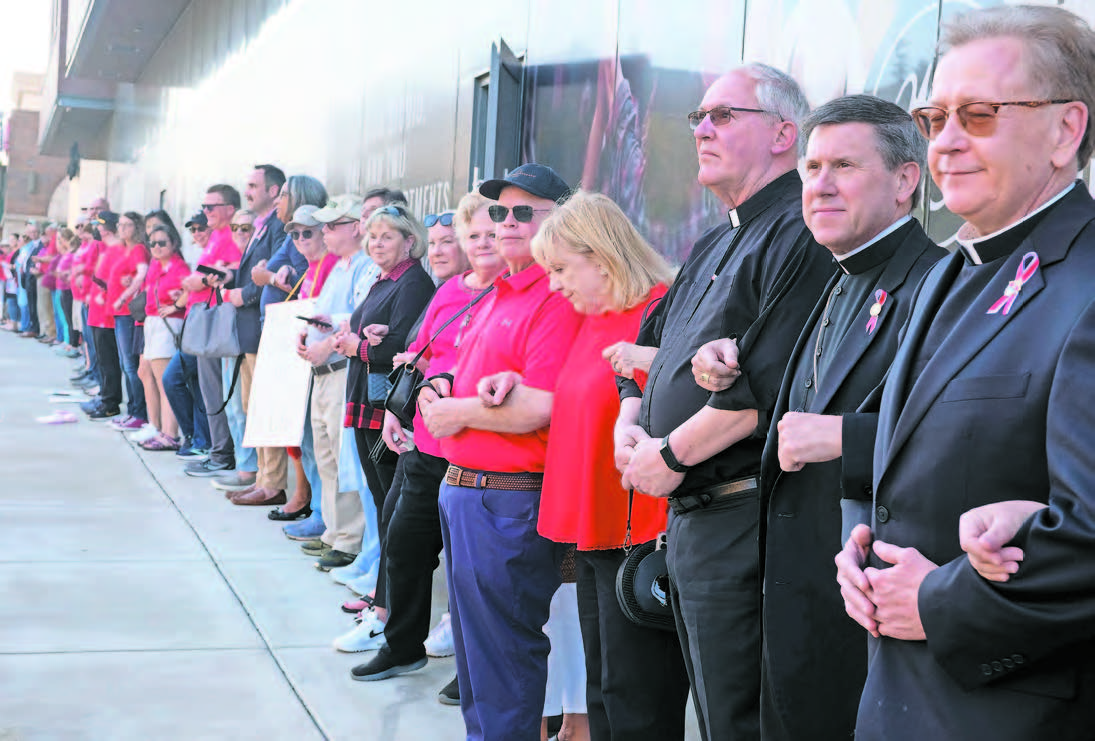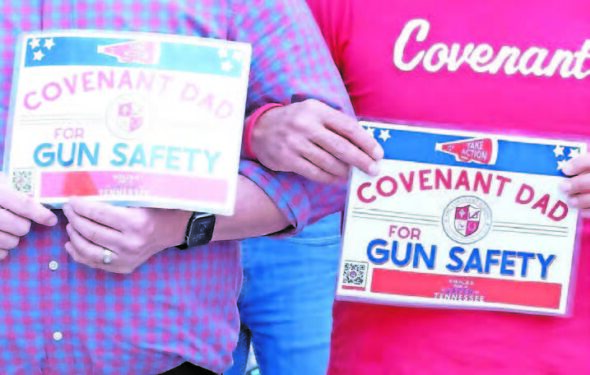
PROSPECT HEIGHTS — Last spring, after a combined 31 Americans were killed in two mass shootings, the federal government passed the most significant gun safety legislation in decades. Still, gun violence has persisted. And in a May 14 USA Today column, President Joe Biden echoed what Catholic leaders have continuously said: “We need to do more.”
The legislation, the Bipartisan Safer Communities Act, has been Biden’s biggest accomplishment in addressing gun violence to date, but it falls short of the measures he has called for through his first term — particularly the revival of an assault weapons ban.
The president has spoken less about the mental health aspect of gun violence, which Catholic leaders have long argued is imperative, in addition to gun accessibility. With that in mind, Catholic advocates against gun violence argue that the Bipartisan Safer Communities Act was a positive first step but not comprehensive enough.
“It was a beginning, but certainly not comprehensive, and so we continue to call for the kind of reform that will provide a universal shift in the way that we understand the value of human life,” Sister Bridget Bearss, a Leadership Conference of Women Religious (LCWR) associate director of transformative justice, told The Tablet.
Sister Bridget said LCWR now wants to see the Biden administration and Congress pursue as “starting places” more aggressive restrictions on assault weapons and high-capacity magazines, implement universal background checks for all gun purchases, and make gun trafficking a federal crime, while simultaneously working to improve access to mental health care.
LCWR is a national organization that advocates in a number of policy areas. With gun violence, it helps those who are affected respond to their local, state, and federal officials and get their voices heard.
“For the dignity and the protection of rights of all human persons, but particularly those who have been most impacted by violent crimes, we have a responsibility to act on behalf of all people to ensure their safety, their protection, and uphold their rights,” Sister Bridget said.
Julie Bodnar, a policy advisor for the U.S. Conference of Catholic Bishops’ Department of Justice, Peace, and Human Development, told The Tablet that her office has been focused on pushing extreme risk protection orders, which are court orders used to keep guns away from people who are at a high risk of using them to hurt other people or themselves.
The Bipartisan Safer Communities Act provided funding for states to implement extreme risk protection order measures on their own, but Bodnar said there needs “to be more done to incentivize states to do that and to support a federal extreme risk protection order.”
In a letter to Congress last spring following mass shootings at a supermarket in Buffalo, New York, and an elementary school in Uvalde, Texas, where a combined 31 people were killed, U.S. bishops called for similar measures to those Sister Bridget outlined,
increase in the minimum age for gun ownership, a ban on “bump stocks,” and policies that work to strengthen family life and address mental health.
“There is something deeply wrong with a culture where these acts of violence are increasingly common,” the letter stated. “There must be dialogue followed by concrete action to bring about a broader social renewal that addresses all aspects of the crisis.”
Data from the Gun Violence Archive, a nonprofit research group that has tracked all gun-related injuries and deaths in the U.S. since 2013, show that as of May 15, there have been more than 15,500 gun violence-related deaths (including suicides) nationwide in 2023, and 225 mass shootings.
Since Biden took office near the start of 2021, there have been about 56,000 gun violence-related deaths — almost 21,000 in 2021 and about 20,000 in 2022, respectively, according to the data. There were about 1,300 mass shootings over that span as well, the data shows.
The number of gun violence-related deaths and mass shootings from 2021 and 2022 are the highest for any two-year span since 2013, when the Gun Violence Archive began tracking the statistics. The organization defines a mass shooting as one in which at least four people were killed or injured.
The most recent mass shooting by this definition came May 15, when four people were killed and two police officers wounded in Farmington, New Mexico. Since the start of April, at least 29 people have been killed in six mass shootings. There was also a mass shooting on March 27, when an assailant shot and killed three children and three adults at a private Christian elementary school in Nashville, Tennessee.
Sister Bridget also highlighted the significant loss of life to gun violence outside of just mass shootings, particularly among minority communities in urban areas.

“We know that there are many places in the United States where there is a loss of life on a daily basis, which leads us to recognize that this is a two-faceted response in which legislative action is necessary…but also providing mental health services,” Sister Bridget said.
Biden’s latest action to tackle gun violence came on March 14, when he announced an executive order to increase the number of background checks conducted before firearm sales, with the intent to move the nation as close to universal background checks as possible without additional legislation from Congress. The executive order also charged his cabinet with submitting reports summarizing progress on the full implementation of the Bipartisan Safer Communities Act.
The act included measures to enhance background checks, especially for those under 21, clarify the requirements to be a federally licensed firearms dealer, and provide $250 million dollars in funding for community-based violence prevention initiatives.
It also provides billions of dollars for communities and schools to implement programs and initiatives to address mental health and family well-being and to give students positive environments both inside and outside of the classroom. It allocates $300 million for schools to enhance their safety measures and systems, as well.
Biden’s recent op-ed touted the accomplishments of the Bipartisan Safer Communities Act and pledged to do as much as possible within his legal authority, but put the onus on a divided Congress to get legislation passed.
In particular, he wants legislation that bans assault weapons and high-capacity magazines, requires gun owners to store their firearms securely, requires background checks for all gun sales, and repeals gun manufacturers’ immunity from liability.
“We cannot sit back and pass this problem off to the next generation to solve,” Biden wrote. “If we wait, too many of them will never have the chance to grow up. They deserve better than that, as do all of the gun violence survivors and victims’ families asking Congress to do more.”
Bodnar acknowledged that a lot of the measures the USCCB advocates for need to come from congressional action but emphasized that both Congress and the Biden administration need to tackle the issue of gun violence.
“We see the statistics. We know that gun violence is on the rise, and we are called to respond,” Bodnar said.
“Gun violence is a life issue, and human life is sacred, and we have to address this threat to life that’s posed by gun violence.”
This is the second in a series about issues President Joe Biden stressed when he ran for office two years ago and where things stand today. Subsequent stories will look at climate change, abortion, and unity.
